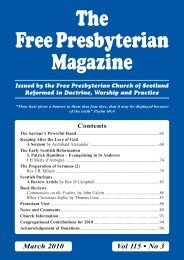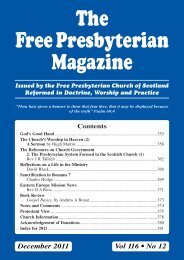February - the Free Presbyterian church of Scotland
February - the Free Presbyterian church of Scotland
February - the Free Presbyterian church of Scotland
Create successful ePaper yourself
Turn your PDF publications into a flip-book with our unique Google optimized e-Paper software.
The<br />
<strong>Free</strong> <strong>Presbyterian</strong> Magazine<br />
Vol 118 <strong>February</strong> 2013 No 2<br />
The Full Price Paid<br />
Peter once asked his Master how <strong>of</strong>ten he could be expected to forgive his<br />
bro<strong>the</strong>r: “Till seven times?” To Peter this must have seemed <strong>the</strong> limit <strong>of</strong><br />
what was reasonable, but Jesus made clear that he must be prepared to forgive<br />
much <strong>of</strong>tener. He told a parable about a King who examined <strong>the</strong> accounts<br />
<strong>of</strong> his servants and found one who was in debt to <strong>the</strong> tune <strong>of</strong> 10 000 talents,<br />
a vast amount <strong>of</strong> money. Out <strong>of</strong> compassion, <strong>the</strong> King cancelled <strong>the</strong> debt.<br />
Yet that servant later demanded repayment from a fellow servant who owed<br />
him a mere 100 pence and refused to show <strong>the</strong> least compassion when <strong>the</strong><br />
o<strong>the</strong>r man was unable to pay. The parable was intended to illustrate <strong>the</strong> reasonableness<br />
<strong>of</strong> forgiven sinners forgiving <strong>the</strong>ir fellows and indeed, before God,<br />
<strong>the</strong>ir obligation to do so. Peter, having been forgiven by God, must be willing<br />
to forgive his bro<strong>the</strong>r, no matter how <strong>of</strong>ten his bro<strong>the</strong>r wronged him.<br />
Clearly <strong>the</strong> parable implies also <strong>the</strong> vast extent to which sinners are in debt<br />
to <strong>the</strong> great King whose subjects we all are. When a sinner is brought to feel<br />
his guilt before God, he must realise that he cannot repay that debt; <strong>the</strong> debt<br />
is far too great, for each individual sin deserves eternal punishment. The sinner<br />
may try to bargain with God and <strong>of</strong>fer some degree <strong>of</strong> payment – some reduction<br />
in his level <strong>of</strong> sinning, or some good works: prayer, for example, or<br />
Bible reading or acts <strong>of</strong> kindness. The first difficulty is that his good works<br />
are <strong>the</strong>mselves imperfect; <strong>the</strong>re is sin in everything he does, for he cannot<br />
meet God’s standard <strong>of</strong> perfect holiness – which requires us to do everything<br />
to God’s glory. So, instead <strong>of</strong> reducing his guilt to God by his good works,<br />
<strong>the</strong> sinner is in fact adding to his debt. The fur<strong>the</strong>r difficulty is that, if he is<br />
to pay <strong>of</strong>f his debt to God, he must pay it in full, he must pay Him “<strong>the</strong><br />
uttermost farthing” (Mt 5:26).<br />
This is what <strong>the</strong> Bible teaches, and what many a sinner has discovered by<br />
experience. He is in debt, but he cannot begin to pay <strong>of</strong>f <strong>the</strong> debt. There is<br />
only one o<strong>the</strong>r possibility: to find someone who can pay <strong>the</strong> debt for him.<br />
Clearly that cannot be a fellow human being, with a debt <strong>of</strong> his own which<br />
is beyond his power to pay. If we were left to our own devices, we could<br />
never discover anyone both willing and able to pay <strong>of</strong>f our debt. But we are

















